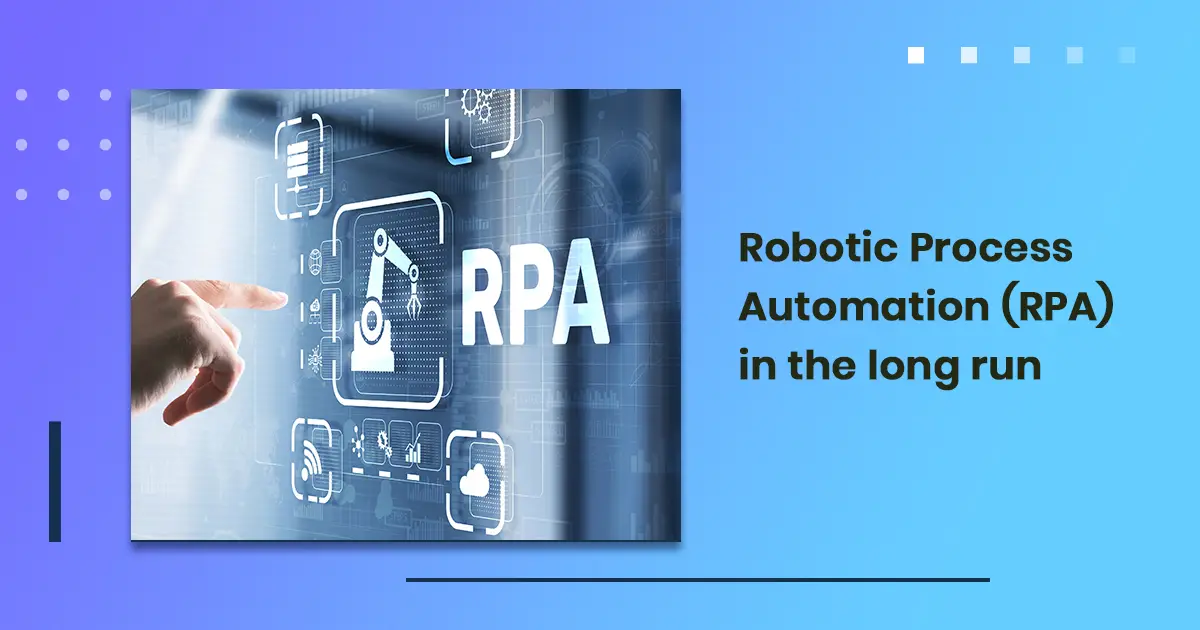
Robotic Process Automation (RPA) in the long run
Dec 29, 2023
Today's business world is not holding hands with the past legacy. Firms paying attention to innovation and investing capital, time and staff in technology win the race.
The gaps in producing talented people in industries opened the path for `Automation´.
Business leaders across industries, in their board meetings, commonly use one strategic word `Automation´. Their idea is to increase productivity using the same set of people.
How do we define RPA Automation
Lao Tzu quotes “The journey of a thousand miles begins with one step”. So, the first step in the automation process is `RPA´ or Robotic Process Automation. At the primary level it mimics human's repetitive and standard jobs. But, at the secondary level it is
- Not removing processes : but driving and redirecting value
- Platform : to add intelligent and difficult steps
- Value created : from back-office functions like finance, payroll etc.
- Staff value added : to do creative tasks
- Not judgmental : follows straight path in working
- Data & Information : reduces time on data and allocates time to make decisions
Therefore, basic questions businesses need to ask in this automation age are…
- Strategy : How can we use technology to use and support strategy?
- Customers : How can they be satisfied?
- Digital vision : Can our management deliver a digital vision and align to deliver?
- Innovation : Are we opening our firms to innovation?
- Culture : Is our firm ready for digital transformation / change?
- HR : Have we got the resources we need or can we hire them?
- Foundation : Are we ready for 24/7 people, processes, technology and vision?
The technologies influencing the changes are through
- RPA
- Driverless vehicles, drones etc
- Artificial intelligence, cloud computing etc.
- Personnel assistance like Amazon Alexa
Why some firms are slow in deploying RPA automation:
- Resistance : Fear of change can cause employees to resist
- Regulation : Government bodies react slowly to the digital age
- Recruitment : Difficulty to get the blend of talent at affordable rate
- Outcome : Change process without disrupting present operations.
How do we evaluate robotic process automation (RPA) in the long run?
Whenever new technology makes in-roads questions arise regarding its future. To prove this point research carried out by Uipath finds that 68% of global workers believe automation makes them productive., while another study by Forrester 66% said RPA restructures existing work, enabling their employees to have more human interactions, and 60% said automation helps people focus on more meaningful, strategic tasks.
Apart from that RPA drives
- Enhanced accountability:
Employees get empowered by the work that needs to be done. They choose projects fitting their skill set, enhancing operations and accountability. - Paperless offices
Through deployment of RPA bots in the work cycle, all repetitive and time-consuming jobs get automated. Without human intervention, there emerges no or less need for paperwork to drive the task. - Eliminates fraud
According to 2008 data from the Association of Certified Fraud Examiners, fraud can increase as much as 80 percent during times of economic stress. This is because bad economic times are ripe for creating the conditions that lead to the fraud triangle (pressure, opportunity, and rationalization). Through RPA automation, the chances are eliminated. - Firms get their business disrupted if they do not follow the recent trends to stay afloat. Competitors always look for loopholes to enter the market and customers look for better experience. Through RPA automation, this is attainable.
What is the current and future market value of RPA?
RPA made its appearance in the automation arena around 2010. Slowly and steadily it climbed the ladder and increased its market value share. Initially, firms considered it a luxury, but lately most companies see it as necessary.
The market indicators from various sources support the point of witnessing a huge surge in RPA. In a study conducted by Grand View Research, ‘The market of RPA is currently valued at USD 1.57 Billion, and is anticipated to witness a CAGR (Compounded Annual rates of growth) of 32.8% from 2020 to 2028.’For instance, Gartner estimated RPA spending will reach $2.4B up to 2022.
If you are an accounting firm, and have not yet taken the step in deploying automation at your practice, you should talk to us, as we are pioneers in the robotic automation area. Visit our website to learn more about our accounting automation solutions or to schedule your free personal demo.
Schedule Your Free Demo
With our accounting automation experts
Find out how other practices have benefited using Integra Balance AI bookkeeping automation. 87% of practices who viewed AI bots in action have instantly discovered the advantages of using them at their firm.
Global Offices
US (Head Quarters)
Integra Global Solutions Corp
7500 Brooktree Road, Suite 100
Wexford (Pittsburgh)
PA 15090
+1 412 267 1529
Philippines
Integra Global Solutions Corp
Ayala Cebu Tower,
Cebu Business park, Cebu 6000
+1 412 267 1529
Europe
Integra Global Solutions UK Ltd
College House
17 King Edwards Road
Ruislip, London, UK, HA4 7AE
+44 (0)20 7993 2949
Canada
Integra Global Solutions Corp
32 Blencathra Hill, Unit 100, Markham
Ontario
+1 412 267 1529
India
Integra Global Solutions Corp
First floor, Kanapathy Towers,
Opp.BSNL exchange, Ganapathy,
Coimbatore – 641 006, India
+91 (0422) 437 9555
Australia
Integra Global Solutions Corp
+61 02 8005 1836
